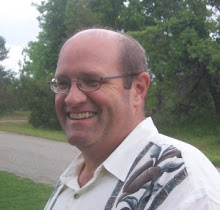Years ago...there was sitcom called "Sledge Hammer". It was a spoof or parody on the old Clint Eastwood "Dirty Harry" movies. It wasn't a very successful sitcom because it only lasted a couple of seasons, but the central character in the sitcom was a guy named Sledge Hammer. He was a no nonsense police detective who continually got himself into some kind of trouble. Sledge Hammer was a complete buffoon, whose best friend was his long barreled .44 Magnum pistol. Although his escapades always started out as disasters, he somehow ironically ended up "getting the bad guy." This usually happened through a series of "lucky" breaks, but never because of Sledge's superior police work or his abilities. Sledge was noted for his laxness regarding department policy and was famous for the tag line "Trust me, I know what I'm doing", after which mayhem usually ensued. I tell that story to relate how trust is more than just a motto. It is more than just some "happen chance luck" that things work out. It is more than just something we expect others to have in us. Trust is one of those delicate issues that can take years to build and minutes to destroy. So the question is how can I build trust in those I serve?
I can start by trusting them. Allow others to make mistakes without fear of retribution. When I trust others, I will allow them to complete the tasks they need to without "constantly checking up on them." It's not that I shouldn't make sure the job done, but I need them to know that if I give them a task, then I trust they will perform it without me looking over their shoulder. This trust of others gives them a sense of empowerment.
Another way to build trust is to listen to the input of others. There are many times that I think we should do something, a particular way. But I will often ask my constituents this question before I say anything; "what do you think we should do?' When I ask that question, it builds trust in my constituents and communicates to them that I value their ideas and input.
I can also build trust by letting others see my transparency. Transparency is a risky business. We don't just walk up to total strangers and start "spilling our guts" about the most intimate details of our life. But if we are to build trust into those we serve, we must be transparent. When others see us in our true "humanity", it puts them at ease and they are better able to trust us and confide in us. This transparency communicates to our constituents that "hey..they trust me enough to share a weakness."
I can build trust in others, by treating them with "dignity and respect". Letting them know they are valuable to the organization and that their ideas are just as important as mine. Granted, there may be times we may have to use the Sledge Hammer approach and tell someone "Trust me, I know what I am doing" but those times should be rare, and only if absolutely necessary. These are times when the risk of a "mistake or failure isn't an option." And in these cases, we better really "know what we are doing" and not just rely on luck as our friend Sledge Hammer did!
It does take time to build trust. I think as we build credibility with others, we build trust and none of that happens "overnight". I have worked with one particular person for 2 years. And it was only last week that they told me something about their life that they had kept "secret". I asked why now, and they simply said that they felt they could trust me. It took 2 years to build that trust. It doesn't happen overnight and we must be patient. But their trust in me can be destroyed in seconds if I violate their confidence in me. "TRUST...VERY DELICATE, FRAGILE, HANDLE WITH CARE!"
